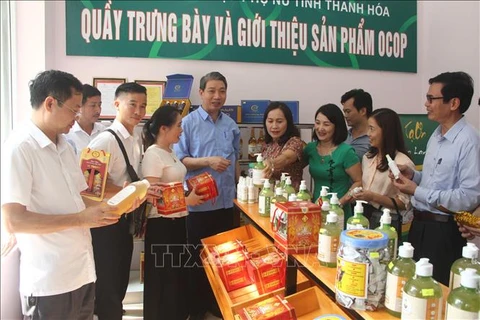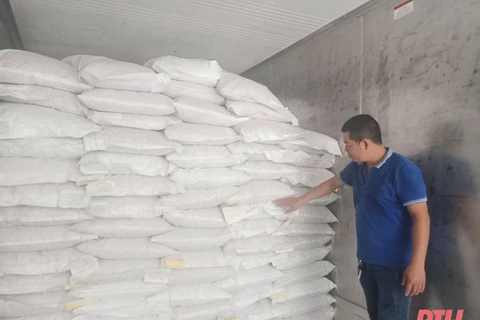Thanh Hoa (VNA) – The Coordinating Office of the New Rural Development Programme in the central province of Thanh Hoa said on August 4 that the locality recently evaluated and classified One Commune, One Product (OCOP) products for the third stage this year.
Twenty six products from 14 districts, townships and cities were under classification. However, only 20 of them were recognised as OCOP products, three of them met four-star criteria, including Ha Lai leaf cake, Ha Trung district’s kitchen utensils, Quang Xuong district’s Quang Phuc fish sauce, and the remaining achieving three-starred standards.
Their production scale are above average and quality enough to be competitive in the market.
After over three years of implementing the OCOP programme, the province had 120 OCOP products as of August, ranking 10th nationwide in terms of the total products. It is now home to one five-star OCOP product, 30 four-star and 89 three-star ones.
To carry out the programme sustainably and effectively, the province took strict steps to evaluate and rank products in the right process. As scheduled this year, it will develop additional 80 provincial-level OCOP products.
Based on registrations by districts, townships and city, the Office will inspect production areas, help owners increase scale and quality, navigate markets and handle necessary procedures to join the programme.
Recognised products must meet all criteria in line with regulations. It is also a key task in the National Target Programme on New Rural Development in the province.
Bui Cong Anh, deputy head of the Office said after having their products recognised for the status, almost businesses and production facilities must expand production scale because their products become more popular.
Recently, several owners of local OCOP products established “Thanh Hoa OCOP cooperative” in line with the Co-operative Law 2012, playing a role as a business to promote trade and develop markets.
In the near future, the Office will work with localities to instruct owners how to invest in modern technology, improve product qualuty, gradually perfect production process in line with the OCOP programme regulations. The province will continue promoting trade at home and abroad, helping firms, cooperatives and owners sell products.
Many OCOP products of Thanh Hoa are exported to foreign countries such as Russia, the Republic of Korea, South Africa, Switzerland, Sweden, the United States, Japan and China.
Le Gia shrimp paste from Hoang Hoa district’s Hoang Phu commune has been exported to Russia, the Republic of Korea, Taiwan (China) and South Africa. Bamboo straws have been shipped to Switzerland, Sweden, and the United State. Handicrafts and other products made from sedge are sold in 64 supermarkets in the United States.
Over the past three years, Thanh Hoa has spent over 114 billion VND (4.9 million USD) supporting the implementation of the OCOP programme. Of these, more than 18.2 billion VND (791,622 USD) came from the central budget, 36 billion VND (1.5 million USD) from the local budget and the rest from producers.
In the 2021-2025 period, the province is striving to have at least three OCOP products rated as five stars, more than 100 as three and four stars, he said.
It will complete the application of information and technology in the production and trading of OCOP products. Each district will have at least one showroom which displays and sell these products. Creative design centres will also be formed in association with OCOP products promotion during the period.
The OCOP was initiated by the Ministry of Agriculture and Rural Development in 2008, following the model of Japan’s “One Village, One Product” and Thailand’s “One Tambon, One Product”. It is an economic development programme for rural areas focusing on increasing internal power and values, which is also meant to help with the national target programme on new-style rural area building./.

Thanh Hoa has 24 more provincial-level OCOP products
The north central province of Thanh Hoa recently announced 24 products meeting standards of its “One Commune-One Product” (OCOP) programme, raising the total number of such products to 76.






















